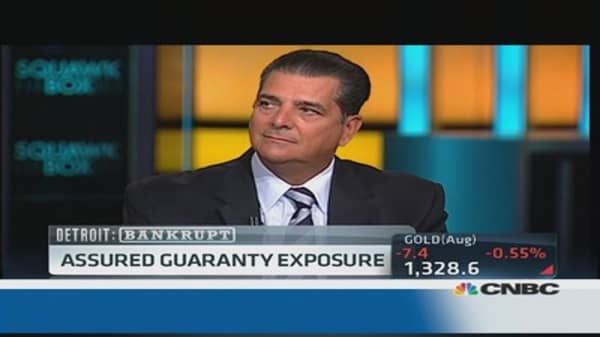If Detroit gets its way in bankruptcy court, the cost of borrowing money for cities and states around the nation could spike, the chief executive of bond insurer Assured Guaranty warned on CNBC on Tuesday.
Like other debt insurance companies, Assured charges the bond issuer a fee in exchange for a promise to make the payments in the event of default. This arrangement makes it easier for cities and states to borrow money for a variety of projects in the $3.7 trillion muni bond market, while providing investors the peace of mind that they'll be paid back.
The total exposure for Assured in Detroit is about $2.1 billion, Dominic Frederico said in a "Squawk Box" interview. The company has insured $1.8 billion of water and sewer bonds, which are secured with a pledge to pay these bonds with "special revenues." Assured also has about $300 million of general obligation (GO) bonds, backed by a pledge to raise taxes if needed to pay the debt.
Detroit emergency manager Kevyn Orr said the city can't increase taxes anymore and asked the bankruptcy judge to treat GO bonds as unsecured debt, like the $6 billion for health and other benefits for retirees and the roughly $3 billion for public pensions.
(Read more: Detroit hurtles toward first bankruptcy hearing)
"If you look at our exposure ... the GO came in, the last bit was in 2008. Most of it was 1999 and 2003," Frederico said. "On the water and sewer, the last insurance we did was 2006. So it's not like we're chasing the ambulance and running right up to the doorsteps of bankruptcy."
UBS muni-bond strategists said Monday that legal precedents, while few, favor holders of general obligation bonds backed by an unlimited property tax. They also believe that the city's water and sewer bonds will be insulated from the city's insolvency.
At about $530 million, GO bonds represent a only small slice of the city's overall $18 billion in debt. But how they're treated could change the dynamics of the financing options for municipalities, Frederico said: "Debit is basically priced based on risk. If you increase the risk of the debt, therefore you increase the cost of the debt."
(Read more: The Detroit decision with trillions on the line)
Meanwhile, private-equity billionaire Wilbur Ross, the largest investor in Assured Guaranty, said that President Barack Obama "has made clear that he doesn't intend to help Detroit."
While the government bailed out AIG and General Motors, "they took equity positions in those companies," Frederico said. "There's no way to take an equity position in the city of Detroit."
Ross, chairman and CEO of WL Ross & Co., said it's up to Detroit to re-imagine itself. "Even if you fix the balance sheet, what it really needs is to start growing again. A city that's shrinking can't be very healthy."
Unions in Detroit and the big companies there need to join together with private-sector developers to buy a lot of assets from the city and really redevelop them, Ross said.
"There's a lot of real estate that the city owns. And I think it could be done if people had the will and made a real master plan," he said. "Many parts of the city are bombed out. We got to reverse that."
—By CNBC's Matthew J. Belvedere. Follow him on Twitter @Matt_SquawkCNBC. CNBC's Lori Ann LaRocco contributed to this report. Follow her on Twitter @loriannlarocco.




